|
|
|
Sort Order |
|
|
|
Items / Page
|
|
|
|
|
|
|
| Srl | Item |
| 1 |
ID:
165317
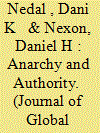

|
|
|
|
|
| Summary/Abstract |
Do international systems tend to remain anarchic because of recurring balances of power, or do they tend toward imbalances and hierarchy? Leading structural theories posit competing predictions about systemic outcomes, and the historical record offers evidence to support both claims. This suggests the need to theorize conditions under which one tendency or another is likely to dominate and what factors lead systems to transition from one state to another. We draw on constructivist and English School insights about international authority and legitimacy to develop such a framework. We conceive of patterns of international authority as structures independent from, and interacting with, mechanisms usually associated with international anarchy, such as the balance of power. We propose that international authority systems vary along two dimensions: particularist cosmopolitan and substitutable nonsubstitutable. Both are emergent properties of ideas and institutions located at the unit level. We argue that certain authority systems—particularist and nonsubstitutable—reinforce, and are reinforced by, anarchy and balanced distributions of capabilities. Others—cosmopolitan substitutable—facilitate rollup and domination and are likely to emerge or be maintained in hierarchic and highly asymmetric systems. By offering a structural account of international authority, we hope to contribute to the global turn in international relations, offering a framework for comparing systems across time and space. We also aim to help make sense of contemporary struggles over norms and values, their structural causes and consequences, and their potential implications for the future of global power politics.
|
|
|
|
|
|
|
|
|
|
|
|
|
|
|
|
| 2 |
ID:
172287
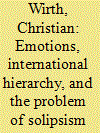

|
|
|
|
|
| Summary/Abstract |
This study offers an explanation for Beijing’s seemingly self-defeating approach to the South China Sea that distances China ever more from the regional and international communities which it wants to lead and join while drawing in the foreign military presence that it seeks to keep at a distance. Combining recent research on the role of emotions and on hierarchy in international politics, this article shows how the powerful narrative of national ‘humiliation’ and ‘rejuvenation’ has informed Chinese maritime politics. As the South China Sea became incorporated in the linear timeline of China’s 5000 year civilizational history, the US’ and its allies’ push-back against Beijing’s territorial claims deepened China’s ideational isolation. The ensuing state of solipsism increases the risk of violent confrontations.
|
|
|
|
|
|
|
|
|
|
|
|
|
|
|
|
| 3 |
ID:
145676
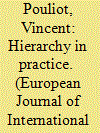

|
|
|
|
|
| Summary/Abstract |
In today’s world, a significant portion of international security politics is conducted through multilateral channels, often from the halls of international organisations such as the United Nations or NATO. This article theorises and empirically documents the production, reproduction, and contestation of local diplomatic hierarchies that practitioners often call ‘international pecking orders’. According to conventional wisdom in IR, the sources of international hierarchies are primarily structural, stemming from the interstate distribution of (material) capabilities. Yet the growing prevalence of multilateral diplomacy in the governance of international security generates distinctive forms of social stratification organised around a struggle for diplomatic competence. As they pursue their instructions and manage security politics, state representatives posted to international organisations make use of the opportunities and constraints of a given situation and compete for rank through the display of practical know-how. The article illustrates this process by looking at how a key set of multilateral practices lend themselves to pecking order dynamics, from esprit de corps to reporting through brokering. By taking the multilateralisation of security politics seriously, the article shows that international hierarchy, far from an unobservable reality, is actually part of parcel of each and every practice that makes the world go round.
|
|
|
|
|
|
|
|
|
|
|
|
|
|
|
|
| 4 |
ID:
124131
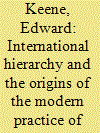

|
|
|
|
|
| Publication |
2013.
|
| Summary/Abstract |
This article argues that hierarchy plays an important role in shaping the practice of intervention, and that the changing nature of international hierarchy is a crucial part of the story of how the modern practice of intervention emerged. It describes the early modern order of precedence, and contends that it was ill-suited to encouraging people to recognise intervention as a distinctive kind of practice. However, over the course of the eighteenth century the structure of international hierarchy changed, with the emergence of a new kind of grading of powers, which provided the context for the development of a practice of intervention after 1815.
|
|
|
|
|
|
|
|
|
|
|
|
|
|
|
|
| 5 |
ID:
144053
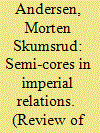

|
|
|
|
|
| Summary/Abstract |
Recently, the field of International Relations has seen increased interest in international hierarchy, and also an upswing in the analytical study of imperial logics of rule. Nonetheless, existing structural models of empire focus on core-periphery dynamics, and so cannot explain polities that display elements of both core and periphery. Therefore, I offer the new concept of ‘semi-cores’. Semi-cores are a specific form of historical political associations whereby certain imperial provinces are different from the others in terms of the close relationships it maintains with the imperial metropolis. Semi-cores are different by virtue of being relatively similar. The conceptualisation of semi-cores is followed by a section illustrating its logic, examining the relatively unfamiliar cases of Scotland and Norway and their position within the Danish and British empires, respectively. Although being separate imperial provinces, these were tightly connected to an imperial core. This concept helps us better understand imperial logics, and in the process shows how cultural factors can be formalised into accounts of structural logics of rule, impacting our understanding of both historical and contemporary hierarchical international affairs.
|
|
|
|
|
|
|
|
|
|
|
|
|
|
|
|
| 6 |
ID:
092884
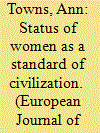

|
|
|
|
|
| Publication |
2009.
|
| Summary/Abstract |
This article focuses on the status of women as a standard of civilization by examining its emergence in the 19th-century European 'society of civilized states.' More specifically, the article centers on expectations about the proper political role of women and how these operated as a standard to distinguish 'civilized' states from other societies. The article shows that the political exclusion of women - not their inclusion - became expected behavior for 'advanced' societies at this time. To statesmen and social scientists alike, evidence from 'savage' society and an uncivilized European past demonstrated that women could not contribute to human advancement if given a political role. To arrive at this claim, the article examines the understandings that had come into place to make the political exclusion of women possible and reasonable for European and European settler states.
|
|
|
|
|
|
|
|
|
|
|
|
|
|
|
|
| 7 |
ID:
084673
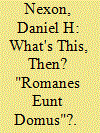

|
|
|
|
|
| Publication |
2008.
|
| Summary/Abstract |
This article cautions against a number of errors endemic to recent attempts to derive "lessons of empire" for United States foreign policy and grand strategy: (1) justifying the comparison between the United States and past imperial polities based on shared characteristics unrelated to the analytic category of empire, (2) failing to offer recommendations specific to imperial dynamics, (3) assuming that "empire" serves as an "analytic box" composed of otherwise indistinguishable entities, and (4) assessing the question of American Empire in categorical, rather than relational, terms. I next offer an ideal-typical account of the structure and dynamics of empires and discuss how such attention to patterns of domination and resistance-which I term the "micropolitics of hierarchy"-might provide better analytic leverage over key contemporary challenges than the traditional states-under-anarchy framework.
|
|
|
|
|
|
|
|
|
|
|
|
|
|
|
|
|
|
|
|
|